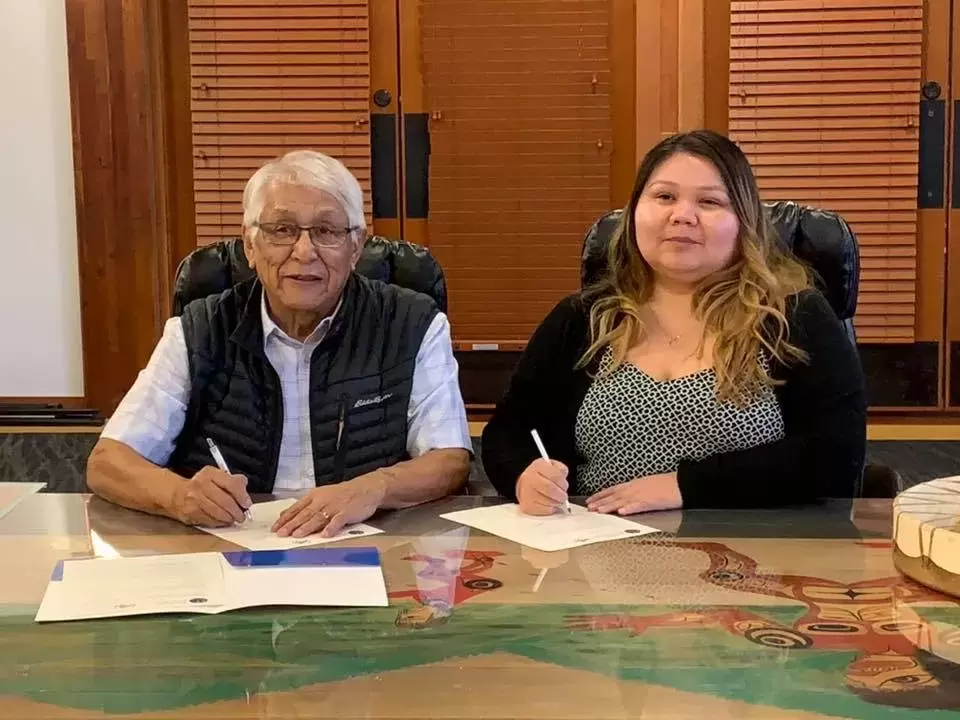Instead of growing increasingly frustrated, Tseshaht First Nation Councillor Wahmeesh, Ken Watts, decided the time was right to express long-standing concerns.
While talking to officials from the Huu-ay-aht First Nations this past December, Watts stated his disappointment his First Nation was not receiving proper recognition for businesses operating in its territory.
That initial discussion led to more talks. And then this past Friday, Feb. 7 the Tseshaht and Huu-ay-aht signed a historic protocol agreement, detailing the proper ways to conduct business.
“I think it just shows sometimes it takes a simple conversation to lead to dialogue which can lead to action,” Watts said of the deal, the first of its kind in the Alberni Valley.
The two First Nations are close and have conducted plenty of business in the past. But a bit of frustration had been brewing since those from the Tseshaht First Nation felt they were not receiving proper recognition.
This included the fact Huu-ay-aht First Nations opened up a government office in Tseshaht territory, without giving proper recognition, about four years ago.
“I think there was hope it would happen – that maybe they’d show up and ask permission,” Watts said, explaining why Tseshaht officials did not ask for recognition in the past from those operating businesses in its territory.
Regardless of how long it took, Watts is pleased with the end result of a signed protocol agreement now.
While there has been plenty of reconciliation talk in recent years, Watts believes the protocol agreement between Tseshaht and Huu-ay-aht is a variation of that.
“I think this is an example of nations reconciling among themselves,” he said.
The protocol agreement is rooted in the sacred principles of ʔiisaak (Utmost Respect), ʔuuʔałuk (Taking Care of….), and Hišuk ma c̕awak (Everything is One). It was signed in front of elected and hereditary leadership from both First Nations. Respected elders were also among those who witnessed the event.
“Our two nations have always been close,” said Huu-ay-aht First Nations Chief Robert Dennis said. “Our elders held that relationship close to their hearts, but we were letting that drift away.”
Dennis acknowledged in the past it was suitable for First Nations to conduct business by hosting and attending potlaches. But he understands the need to do things differently.
“Now we have to look at things differently in a modern world,” Dennis said. “Instead of potlatches we use paper. But we cannot forget our connections and our traditional ways of working together for the best of both nations.”
Huu-ay-aht Hereditary Chief Jeff Cook is hoping the protocol agreement serves as an example to others.
“I am proud of what we are doing,” he said. “It is a little step, but it shows we appreciate each other and our relationship. I see a vision where all nations move forward together like this, and we’d all be successful. It’s about making a better life for our people and trying to improve all of our lives.”
Tseshaht Chief Councillor Cynthia Dick also supports the new protocol agreement.
“This is important business that we are doing,” she said. “It is a reminder that we are walking in both worlds, and it is amazing to see our nations put things aside to look for better ways to work together in the future.”
The protocol agreement ensures that the Huu-ay-aht First Nations will use appropriate acknowledgement signs for all of its businesses operating in Tseshaht territory.
The agreement also details how both the Huu-ay-aht and Tseshaht nations will explore ways to work together economically. Potential partnerships as well as business opportunities, investments and planned developments are to be well communicated by both parties.
Additionally, the two nations agreed to meet quarterly to discuss possible partnership opportunities. There will also be annual reviews of the protocol agreement.
Watts is hoping Friday’s protocol signing leads to other ones as well. He said there are four other First Nations operating businesses in Tseshaht territory without giving proper acknowledgements, and he has already been in touch with one of them.
“We’re hoping this sets the precedent in our territory,” Watts said. “At the end of the day we will reach out to who we have to.”







